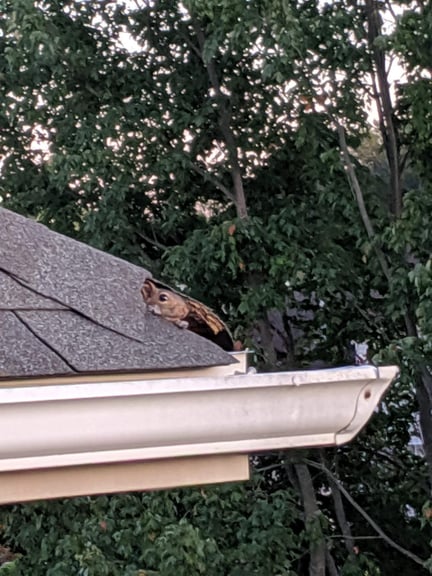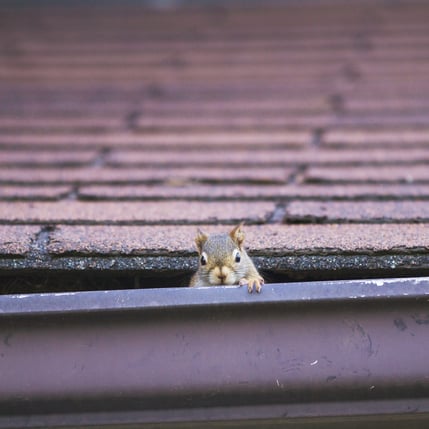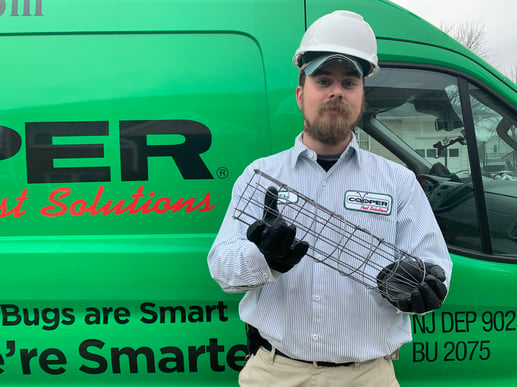Picture this. It’s winter time, and you’re ready to settle in with your book or tv show under a peaceful, warm blanket. This winter vision couldn’t be more relaxing until wait…what is that? The quiet atmosphere is suddenly broken when you hear scratching and running in your walls and attic. Squirrels moved in and have no plans to leave or quiet down. By this point, you’re ready to call a wildlife or pest control professional. Questions start racing through your mind. How do pest control companies get rid of squirrels? How do you get rid of squirrels without killing them? How much does it cost to get rid of squirrels? The answers are closer than you think.
How do squirrels get indoors?
Squirrels will use any opening they find to enter your home and nest, especially during the fall and winter. Broken attic and gable vents in addition to holes in soffits and eaves provide easy access for squirrels. Exposed entry points along gutter lines are also vulnerable to squirrel activity. The problem with squirrels is that the hole they use can be small and out of sight without climbing up a ladder or getting onto your roof. If you have branches from trees that are touching your home in any way, squirrels can use them as a natural bridge to climb onto your roof and explore. Attics, wall voids, and crawl spaces are the most common squirrel nesting spots indoors.

Homeowners and commercial property owners suffer from squirrel nesting year-round. During the fall and winter, squirrel infestations are the most abundant. Just like most insects, rodents, and even humans, squirrels find winter weather to be unpleasant. In an attempt to escape the cold and find shelter, squirrels seek out ways to survive. All of the heat that you’re paying for is quickly escaping through holes and breaks leading into your home, drawing in squirrels. Even though they might be cute and fuzzy, these rodents can truly cause havoc when left to their own devices inside houses.
Should I be worried about squirrels?
Not only are squirrels nesting in the home a nuisance, but they can also cause substantial damage to the structure by gnawing holes, destroying insulation, chewing wires, and contaminating surfaces with their urine and feces. Fires and short circuits can happen if squirrels chew through electrical wires, which is more common than you may think. If squirrels have chosen your attic to call home, that means all of your valuables can be in danger of becoming destroyed and contaminated. Damage caused by squirrels can be more than just financial; it can also be emotionally devastating to have prized possessions damaged beyond repair.

A lot of people are concerned about potential diseases and illnesses that squirrels can transmit through biting and scratching. Even if squirrels are in your home, the chances of you actually coming into contact with them are low, and the possibility of disease transmission from interactions with squirrels, even if unlikely, is present. The biggest concern for you as a homeowner is the fact that when squirrels come in, they aren’t too keen on leaving. Squirrels are territorial and have an excellent sense of navigation, which makes trapping and relocating less than ideal.
Is squirrel removal humane?
Humane pest control is a concern not only for animal lovers but for pest control and wildlife removal professionals alike. No one wants to harm our bushy-tailed friends, but at the same time, it’s unsanitary (not to mention noisy) when squirrels live in your attic or walls. While we can’t speak for other companies, we can tell you how Cooper Pest Solutions gets rid of squirrels that are indoors.
When we perform an initial inspection for squirrel activity, we’ll search for entry points to identify the source of the problem. Once the best strategy is determined to rid your home of squirrels, our exclusion specialists will install one-way doors to let the squirrels leave on their own terms, and they will not be able to reenter. After the squirrels have left, we can begin the pest control method of “exclusion.” Exclusion is the sealing of holes and openings where a pest such as squirrels, mice, birds, or bats are entering. When it comes to squirrels, we will exclude openings with a combination of sealing, capping, screening, and metal flashing installation. GutterLock installation is available for further protection to ensure squirrels cannot use a builder’s gap where your home meets the gutters as an entry point. There is no euthanization or trapping and relocating of squirrels involved in our service.

Pictured Above: Cooper's Exclusion Expert Mike holding a one-way door for squirrels to exit the attic
How much does it cost to get rid of squirrels?
Squirrel removal is a part of Cooper’s Rodent and Wildlife Exclusion Service. The service is a permanent solution to squirrel, wildlife, and recurring rodent infestations. Several factors go into the pricing for an exclusion service. Because the scope of the infestation, damage, type of pest, and number entry points varies for every home, there is no flat fee for the service. Pricing is based on a combination of linear feet, stories of the home, the specific pest that you’re dealing with, and the materials needed to complete the service. Exclusion is a permanent solution to eliminate squirrels and other pest issues, and all members of our dedicated exclusion team are also certified pest management professionals. We stand behind our guarantee with professionalism and the highest level of expertise. To learn more about our Rodent and Wildlife Exclusion Service, watch the information video below.
Are you ready to get started? So are we! Call us at 1-800-949-2667 or fill out the contact form on this page to schedule a free inspection at your home.

